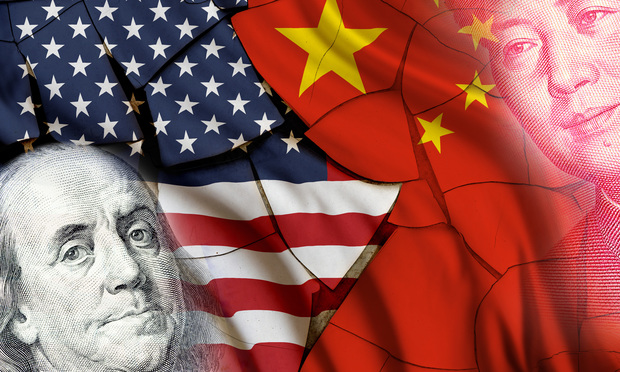CFIUS Still Approving Well-Prepared Chinese Deals
The Pentagon has called for "hyper-vigilance" in reviewing foreign investment because of the economic uncertainty caused by the COVID-19 pandemic. There has already been a negative focus on trade with China and continuing scrutiny of China-based investment by U.S. government officials should be expected. This does not mean that deals cannot be approved.
May 07, 2020 at 02:02 PM
6 minute read
The original version of this story was published on Corporate Counsel

The Pentagon has called for "hyper-vigilance" in reviewing foreign investment because of the economic uncertainty caused by the COVID-19 pandemic. There has already been a negative focus on trade with China and continuing scrutiny of China-based investment by U.S. government officials should be expected. This does not mean that deals cannot be approved.
In fact, China has led all countries in deals approved by the Committee on Foreign Investment in the United States over the last decade (which can be referenced in the CFIUS 2015 and 2016-2017 annual reports to Congress). However, Chinese investors have had significant deals publicly blocked from closing or been forced to unwind their transactions by three U.S. presidents.
There have also been other instances in which Chinese companies have been told by CFIUS not to proceed with a deal or to unwind it, as illustrated by the situation with Grindr. All of this could create an impression that Chinese investors cannot do business in the U.S., but the numbers thus far prove this to be untrue.
One explanation for this seemingly contradictory data is that the CFIUS process is exclusively focused on reviewing transactions for national security concerns. China's success over the past decade in originating approved deals makes one thing clear: if a transaction does not present a national security concern, it is likely to be cleared regardless of the investor's country of origin. If there is a national security concern, but that concern can be mitigated with auditable controls, it will be approved.
In the case of China, the level of Chinese government involvement is crucial.
CFIUS approval for a deal involving an investment from China frequently comes with controls and requires mitigation. To help companies successfully navigate the CFIUS mitigation process, below is an overview of the new Foreign Investment Risk Review Modernization Act regulations that came into effect on Feb. 13, and guidance on how to anticipate mitigation terms and construct them to best position the company to be competitive in its industry.
What Companies Need to Know
The recent expansion of CFIUS's jurisdiction by Congress, beyond purchasing control of a target, to include investments that give access to non-public information or a say in the management of the company were driven, in part, by concerns over Chinese investment. The issuance this year of related regulations further demonstrates that there will be more CFIUS scrutiny of deals involving technology and critical infrastructure. Companies that possess or handle sensitive data will also get increased CFIUS scrutiny, as will investment in real estate near sensitive government facilities.
However, it's important to understand that the presence of a national security concern alone will not necessarily kill a transaction. Should there be a CFIUS concern, the transaction can still be cleared by CFIUS, if mitigation terms that remove the national security concern can be implemented and agreed upon by all parties. If you can build trust, approval can be attained and Chinese investors have been able to consistently meet this standard.
This is not to say that Chinese investors are free of challenges. Many U.S. officials are concerned about Chinese investment being used as a tool for espionage or military advantage. These concerns are valid and any proposed Chinese transaction or investment will receive significant scrutiny.
The key distinction is that the CFIUS review is of the parties involved in the transaction, not the governments. So, while the Chinese government is of significant concern at CFIUS, the Committee is still approving Chinese deals, particularly, if the parties are willing to adopt mitigation terms that will remove the national security concern.
Understanding Mitigation Terms
Common CFIUS mitigation terms stipulate that: company employees be U.S. citizens only; the company have separate IT systems, separate facilities, and independent auditors or monitors; and the company "fence off" sensitive data and/or technology.
| Home Country or Geographic Economy | 2015 | 2016 | 2017 | Total 2015 – 2017 |
| CHINA | 29 | 54 | 60 | 143 |
| CANADA | 22 | 22 | 22 | 66 |
| JAPAN | 13 | 13 | 20 | 46 |
| UK | 19 | 7 | 18 | 44 |
| FRANCE | 8 | 8 | 14 | 30 |
Source: CFIUS Annual Report to Congress (Public version) CY 2016 & CY 2017
During a CFIUS filing process there can be two parallel mitigation processes. If a target company is a cleared government contractor that handles classified information, it cannot be owned or influenced by a foreign entity without a mitigation agreement with the Defense Counterintelligence and Security Agency, which administers the industrial security program for the United States government.
DCSA mitigation agreements have structural requirements that demand separate facilities, systems and employees, as well as terms requiring independent U.S. citizen board members and company officers. In some Chinese deals not involving classified information, CFIUS has required similar structures requiring independent U.S. citizen board members, U.S. citizen employees and other requirements.
Mitigation agreements offer a tremendous opportunity. If CFIUS is willing to enter into such an agreement, a certain level of trust—by definition—has been established. For Chinese investors that intend to focus on the U.S. market, trust is a key building block in any U.S. strategy. Ultimately, companies that involve experts who understand mitigation agreements, as well as the commercial realities of the target business and do the advance work, will be best positioned for success. If it is likely for a Chinese investor to have mitigation requirements from CFIUS, it is vital that companies anticipate those concerns and construct a mitigation regime that will assuage concerns, streamline the process and reduce the risk of being a drag on company-performance.
Scott Boylan is a partner in the Washington, D.C., office of StoneTurn, where he advises clients on trade compliance, investment security and government contracting. He previously served as chief legal officer for large, CFIUS-mitigated companies and established the U.S. Department of Homeland Security's role on CFIUS.
This content has been archived. It is available through our partners, LexisNexis® and Bloomberg Law.
To view this content, please continue to their sites.
Not a Lexis Subscriber?
Subscribe Now
Not a Bloomberg Law Subscriber?
Subscribe Now
NOT FOR REPRINT
© 2025 ALM Global, LLC, All Rights Reserved. Request academic re-use from www.copyright.com. All other uses, submit a request to [email protected]. For more information visit Asset & Logo Licensing.
You Might Like
View All
The Quiet Revolution: Private Equity’s Calculated Push Into Law Firms
5 minute read

Trending Stories
- 1In-House Lawyers Are Focused on Employment and Cybersecurity Disputes, But Looking Out for Conflict Over AI
- 2A Simple 'Trial Lawyer' Goes to the Supreme Court
- 3Clifford Chance Adds Skadden Rainmaker in London
- 4Latham, Kirkland and Paul Weiss Climb UK M&A Rankings
- 5Goodwin Hires Quinn Emanuel Partner to Launch Office in Brussels
Who Got The Work
J. Brugh Lower of Gibbons has entered an appearance for industrial equipment supplier Devco Corporation in a pending trademark infringement lawsuit. The suit, accusing the defendant of selling knock-off Graco products, was filed Dec. 18 in New Jersey District Court by Rivkin Radler on behalf of Graco Inc. and Graco Minnesota. The case, assigned to U.S. District Judge Zahid N. Quraishi, is 3:24-cv-11294, Graco Inc. et al v. Devco Corporation.
Who Got The Work
Rebecca Maller-Stein and Kent A. Yalowitz of Arnold & Porter Kaye Scholer have entered their appearances for Hanaco Venture Capital and its executives, Lior Prosor and David Frankel, in a pending securities lawsuit. The action, filed on Dec. 24 in New York Southern District Court by Zell, Aron & Co. on behalf of Goldeneye Advisors, accuses the defendants of negligently and fraudulently managing the plaintiff's $1 million investment. The case, assigned to U.S. District Judge Vernon S. Broderick, is 1:24-cv-09918, Goldeneye Advisors, LLC v. Hanaco Venture Capital, Ltd. et al.
Who Got The Work
Attorneys from A&O Shearman has stepped in as defense counsel for Toronto-Dominion Bank and other defendants in a pending securities class action. The suit, filed Dec. 11 in New York Southern District Court by Bleichmar Fonti & Auld, accuses the defendants of concealing the bank's 'pervasive' deficiencies in regards to its compliance with the Bank Secrecy Act and the quality of its anti-money laundering controls. The case, assigned to U.S. District Judge Arun Subramanian, is 1:24-cv-09445, Gonzalez v. The Toronto-Dominion Bank et al.
Who Got The Work
Crown Castle International, a Pennsylvania company providing shared communications infrastructure, has turned to Luke D. Wolf of Gordon Rees Scully Mansukhani to fend off a pending breach-of-contract lawsuit. The court action, filed Nov. 25 in Michigan Eastern District Court by Hooper Hathaway PC on behalf of The Town Residences LLC, accuses Crown Castle of failing to transfer approximately $30,000 in utility payments from T-Mobile in breach of a roof-top lease and assignment agreement. The case, assigned to U.S. District Judge Susan K. Declercq, is 2:24-cv-13131, The Town Residences LLC v. T-Mobile US, Inc. et al.
Who Got The Work
Wilfred P. Coronato and Daniel M. Schwartz of McCarter & English have stepped in as defense counsel to Electrolux Home Products Inc. in a pending product liability lawsuit. The court action, filed Nov. 26 in New York Eastern District Court by Poulos Lopiccolo PC and Nagel Rice LLP on behalf of David Stern, alleges that the defendant's refrigerators’ drawers and shelving repeatedly break and fall apart within months after purchase. The case, assigned to U.S. District Judge Joan M. Azrack, is 2:24-cv-08204, Stern v. Electrolux Home Products, Inc.
Featured Firms
Law Offices of Gary Martin Hays & Associates, P.C.
(470) 294-1674
Law Offices of Mark E. Salomone
(857) 444-6468
Smith & Hassler
(713) 739-1250









